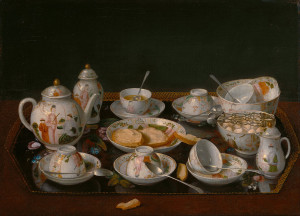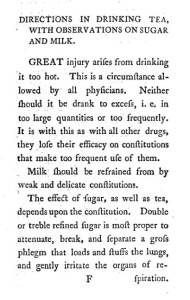Yesterday was National Tea Day, and it of course got me looking at period tea resources.
One of the things I found was a small pamphlet from 1785 called The Tea Purchaser’s Guide; or the Lady and Gentleman’s Tea Table and Useful Companion in the Knowledge and Choice of Teas (seriously, they loved long titles in the eighteenth century). It was written by one G. Kearsley of No. 46, Fleet Street, formally of the East India company’s Service “particularly in the Tea Department” (price one shilling).
It has sections on types of tea, judging tea quality, and the making to tea, all of which is great fodder for scenes in books where you need someone to be doing something nonconsequential while events unfold. So while the hero might expound upon snuff, the heroine (or indeed the hero, as men like tea, too!) can talk about tea, or have a calamity where the housekeeper has purchased adulterated tea, or talk about the blending of tea (of which he also gives advice).
I found his opinions about black verses green tea interesting as well. Black tea, he maintains, is injurious to those with coughs, asthma, or other issues with their lungs. In particular, he believes bohea (the lowest quality black tea) will particularly add to your suffering if drunk while ill with any such issues. Green tea on the other hand he says is “of great disadvantage to shattered constitutions, and those that are worn down by long and continued fever.”
What I find most interesting though is his lumping tea in with drugs and warning people not to consume too much of it.
So happy tea drinking! Is there any tidbit of tea history you’d like to share? Please let us know what your favorite obscure tea fact is in the comments. Or just talk about your favorite kind. Mine is Numi’s Basil Mint Pu-Erh, which they have sadly discontinued. I went a little nutty when they did and bought 20 (100 tea bag) cases. It will be a sad, sad day at my house when those bags are gone…



Interesting that your “expert” advised people with asthma to avoid black tea. Black tea contains a bronchodilator and caffeine also acts to open up the airways. The steam helps too. It’s used as a folk remedy for asthma.
[…] Happy (belated) National Tea Day Yesterday was National Tea Day, and it of course got me looking at period tea resources. One of the things I found was a small pamphlet from 1785 called The Tea Purchaser’s Guide; or the Lady and Gentleman’s Tea Table … Continue reading → […]